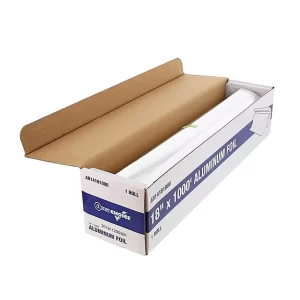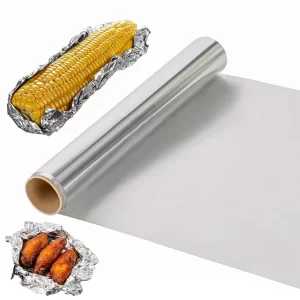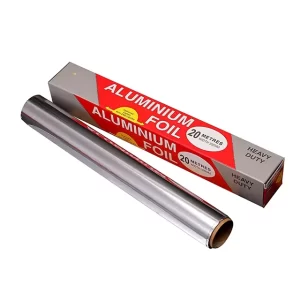Aluminum Foil Rolls
Aluminum Foil Rolls
Product Categories
Product Recommend
Talk to an Expert
- Email: [email protected]
- WhatsApp: +86 18838007960
- Wechat: businessinquiry
- Phone: +8618838007960
Henan Yongsheng Aluminum Co., Ltd.: Your Reliable Aluminum Foil Rolls Manufacturer
Our company has 25 years of experience in aluminum foil business. Our main products include aluminum foil rolls, tin foil boxes, aluminum foil containers, aluminium foil pans, tin foil trays, aluminum foil raw materials, disposable aluminium pans, etc. YSA factory uses automated production lines and mainly exports to more than 30 countries and regions, including the United States, Canada, Australia, Saudi Arabia, Russia, Japan, South America, Western Europe, and the Middle East. We have a professional first-class sales team, technical team, quality inspection team, and after-sales service team.
Rich Types
YSA can produce food packaging aluminum foil containers, takeaway containers, disposable aluminum foil pans including rectangular aluminum foil trays, round foil pans, aluminum baking pans, multi-chamber aluminum foil trays, aluminum pans with lids and more.
Customization Service
YSA provides customized aluminum foil container services, including customization of container size, shape, thickness and material; appearance design and printing; packaging and shipping services. Free samples, OEM and ODM services are also available.
Guaranteed Quality
YSA aluminum foil products have passed BSCI, OU, HACCP, FDA, ISO9001, BRC and other official certifications. We can provide you with free certification to ensure quality and food-grade safety.
Countless Advantages
YSA aluminum foil containers are heat-resistant, waterproof and oil-proof. They can be used for food storage, freezing, baking and cooking. It is the best disposable takeaway container for the catering.
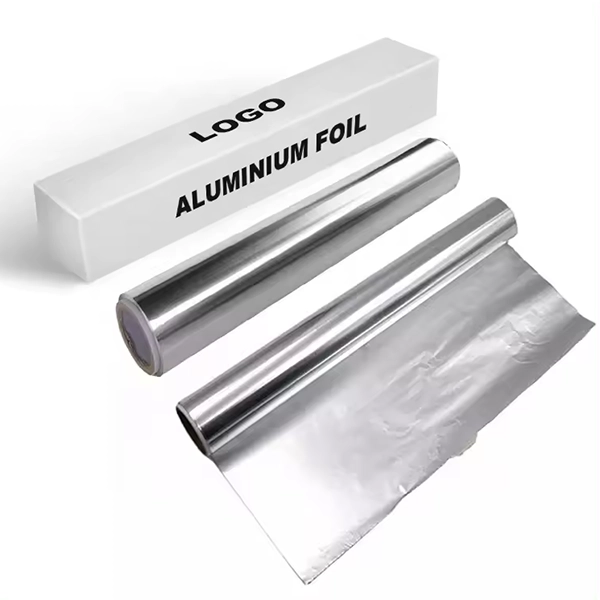
What Is Household Aluminum Foil Roll?
Household aluminum foil rolls are also called kitchen aluminum foil and packaging foil. They are food-grade aluminum foils made of pure aluminum foil film. They are thin sheets formed by multiple rollings of pure aluminum. They are widely used in food and storage processes in homes, hotels, and restaurants.
Yongsheng provides customers with household foil large rolls, which you can then divide into small rolls and distribute to supermarkets and end users.
Aluminium Foil Roll Features
Barrier properties:
Aluminum foil is a barrier to moisture, light, oxygen, and bacteria, preserving freshness and flavor.
Thermal conductivity:
It is known for its high thermal conductivity, distributing heat efficiently. This makes it suitable for cooking, baking, and grilling.
Heat resistance:
Aluminum foil can withstand high temperatures and will not melt or catch fire when cooking and baking.
Durability:
Heavy-duty aluminum foil is strong and does not easily tear or break, even when wrapping heavy or sharp objects.
Versatility:
It can be easily molded and shaped to wrap food, line baking sheets, or cover dishes.
Non-toxic and safe:
Aluminum foil is safe for use in contact with food and does not react with most foods, making it a top choice for food storage and preparation.
Kitchen Aluminum Foil Roll Specifications
Household Aluminium Foil Size Chart
| Size | Thickness | Pcs/Ctn | Carton Size | Cube |
|---|---|---|---|---|
| 10mx300mm | 9-25mic, customization | 24 | 28x19x32cm | 0.017cbm |
| 20mx300mm | 9-25mic, customization | 24 | 28x19x32cm | 0.017cbm |
| 30mx300mm | 9-25mic, customization | 24 | 28x19x32cm | 0.017cbm |
| 50mx300mm | 9-25mic, customization | 12 | 23x17.5x33.5cm | 0.013cbm |
| 100mx300mm | 9-25mic, customization | 6 | 22.5x15.5x34.5cm | 0.012cbm |
| 150mx300mm | 9-25mic, customization | 6 | 35x29x20cm | 0.020cbm |
| 5mx450mm | 9-25mic, customization | 24 | 28x19x47cm | 0.025cbm |
| 10mx450mm | 9-25mic, customization | 24 | 28x19x47cm | 0.025cbm |
| 20mx450mm | 9-25mic, customization | 24 | 32.5x22x47cm | 0.034cbm |
| 150mx450mm | 9-25mic, customization | 6 | 50x29x29cm | 0.042cbm |
| 100mx290mm | 9-25mic, customization | 4 | 34.5x13.8x13.8cm | 0.007cbm |
| 120mx290mm | 9-25mic, customization | 4 | 34.5x14x14cm | 0.007cbm |
| 25 sq ft | 9-25mic, customization | 24 | 28x19x32cm | 0.017cbm |
| 37.5 sq ft | 9-25mic, customization | 24 | 28x19x37cm | 0.025cbm |
| 75 sq ft | 9-25mic, customization | 24 | 28x19x32cm | 0.017cbm |
| 200 sq ft | 9-25mic, customization | 12 | 27x20.5x32.5cm | 0.018cbm |
| 8mx250mm | 9-25mic, customization | 60 | 44.5x27.3x27.5cm | 0.034cbm |
| 15mx250mm | 9-25mic, customization | 50 | 44.5x23x27.5cm | 0.028cbm |
| 16mx250mm | 9-25mic, customization | 50 | 44.5x23x27.5cm | 0.028cbm |
| 50mx250mm | 9-25mic, customization | 24 | 31.5x21.5x27.5cm | 0.019cbm |
Foodservive Aluminium Foil Size Chart
- Economic Foodservice Foil Rolls:
| Size | Pcs/pallet | Pallet Size | Cube |
|---|---|---|---|
| 12inx1000ft | 216 | 114x104x117cm | 1.387cbm |
| 18inx500ft | 160 | 120x108x90cm | 1.166cbm |
| 18inx1000ft | 160 | 114x104x128cm | 1.518cbm |
- Standard Foodservice Foil Rolls:
| Size | Pcs/pallet | Pallet Size | Cube |
|---|---|---|---|
| 12inx500ft | 216 | 114x104x117cm | 1.387cbm |
| 12inx1000ft | 216 | 114x106x117cm | 1.387cbm |
| 18inx500ft | 160 | 120x108x90cm | 1.166cbm |
| 18inx1000ft | 160 | 114x104x128cm | 1.518cbm |
- Heavy Duty Foodservice Foil Rolls:
| Size | Pcs/pallet | Pallet Size | Cube |
|---|---|---|---|
| 12inx500ft | 216 | 114x104x117cm | 1.387cbm |
| 18inx500ft | 160 | 120x108x90cm | 1.066cbm |
| 18inx1000ft | 160 | 114x104x128cm | 1.518cbm |
| 24inx1000ft | 160 | 120x108x75cm | 0.972cbm |
- Extra Wide Foodservice Foil Rolls:
| Size | Pcs/pallet | Pallet Size | Cube |
|---|---|---|---|
| 18inx1000ft | 160 | 114x104x117cm | 1.518cbm |
| 24inx1000ft | 160 | 120x108x75cm | 0.972cbm |
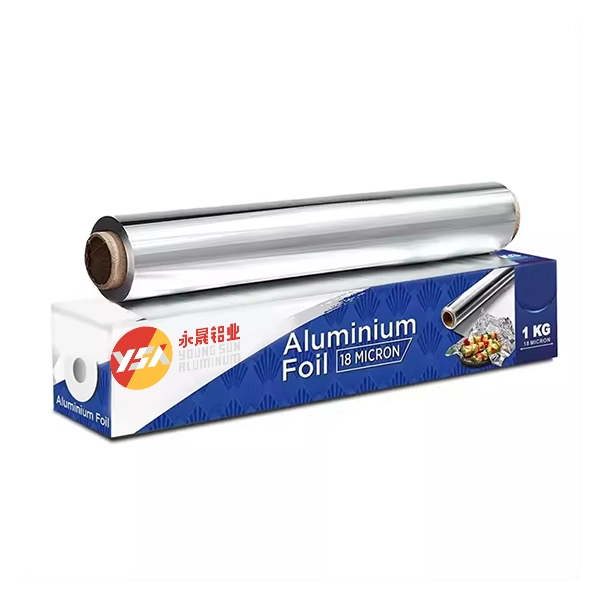
Aluminium Foil Rolls Production Process
Melting and Casting:
Aluminum ingots are melted in a furnace and then cast into large slabs or ingots.
Hot Rolling:
The cast aluminum sheets are heated and rolled into thinner sheets, a process called hot rolling.
Cold Rolling:
The thickness of the hot-rolled sheets is further reduced by cold-rolling, which is performed at room temperature. This step achieves the thickness required for aluminum foil, which can be as thin as 0.006 mm.
Annealing:
The aluminum sheets are then annealed, a heat treatment process that softens the metal, making it more pliable, and removes any internal stresses caused by rolling.
Rolling to Final Thickness:
The aluminum sheets undergo additional rolling to achieve the final thickness required for household aluminum foil. This step requires multiple passes through the rolling mill.
Trimming and Slitting:
The edges of the aluminum foil are trimmed to remove any rough or uneven parts, and then the foil is cut into rolls of the desired width.
Packaging:
The finished aluminum foil is rolled onto a cardboard core and packaged for distribution. It may also be treated with a food-safe coating or embossed for added strength and texture.
Aluminum Foil Roll Types
Extra Wide Foodservice Foil Rolls
Extra wide food foil rolls are made from high-quality aluminum. They are tear-resistant, puncture-resistant, and bend-resistant. They are typically 18 to 24 inches or larger, which is larger than standard foil rolls. In addition to this, extra-wide food foil rolls also act as a barrier against moisture, oils, and contaminants.
Standard Foodservice Foil Rolls
Standard food foil rolls are the most common type found in households and are used for everyday tasks such as covering dishes, wrapping food, and lining baking sheets. They resist moisture, oils, and odors, ensuring that food remains fresh and uncontaminated. Standard catering foil rolls come in a variety of sizes and thicknesses, and their roll format facilitates portioning.
Heavy Duty Foodservice Foil Rolls
Heavy-duty food foil rolls are thicker and more durable foils. It withstands high temperatures, rigorous handling, and prolonged exposure to the elements, making it an indispensable material in demanding environments.
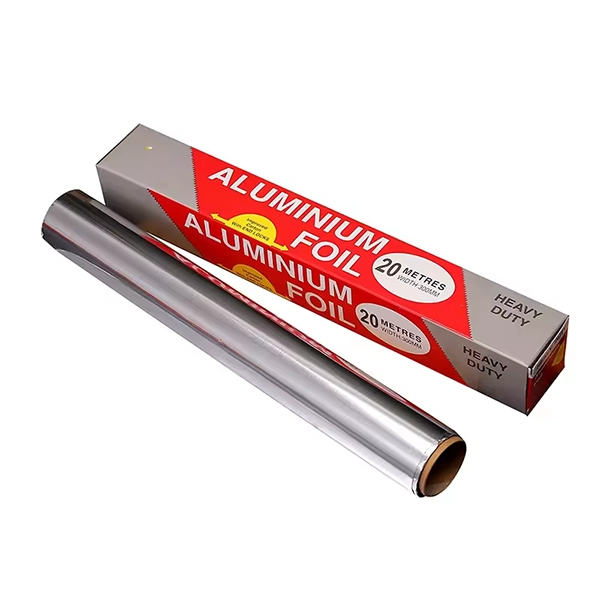
How To Choose Aluminium Foil Rolls
Thickness
0.01mm standard aluminum foil for daily household use is suitable for wrapping food. The thicker 0.015mm aluminum foil is more suitable for baking, grilling, or freezing food and has better strength and tear resistance.
Size
Household aluminum foil rolls usually have different widths and lengths. The common width is 30-40cm, which can cover most baking trays or food packaging. The length is generally 10m and above.
Function
There are some special designs in the functions of household aluminum foil rolls on the market, such as anti-stick coated aluminum foil, double-sided smooth aluminum foil, and pre-cut aluminum pop up foil.
Safety
Choose food-grade aluminum foil to ensure that it does not contain harmful substances and is safer to use. When purchasing, you can give priority to products containing recycled aluminum ingredients.
Thickness
0.01mm standard aluminum foil for daily household use is suitable for wrapping food. The thicker 0.015mm aluminum foil is more suitable for baking, grilling, or freezing food and has better strength and tear resistance.
Size
Household aluminum foil rolls usually have different widths and lengths. The common width is 30-40cm, which can cover most baking trays or food packaging. The length is generally 10m and above.
Function
There are some special designs in the functions of household aluminum foil rolls on the market, such as anti-stick coated aluminum foil, double-sided smooth aluminum foil, and pre-cut aluminum pop up foil.
Safety
Choose food-grade aluminum foil to ensure that it does not contain harmful substances and is safer to use. When purchasing, you can give priority to products containing recycled aluminum ingredients.
Tips For Using Aluminum Foil Roll In Your Life
Make a Frying Pan
If you don’t want to bring a frying pan with you on your next camping trip, you can create your own frying pan by centering a forked stick on two layers of heavy-duty aluminum foil. Wrap the edges of the foil tightly around the forked stick while leaving some slack in the foil between the forks. Flip the stick over and press down the center to contain the food for frying.
Bake a Pie Crust
Some of these foil tips will help you in the kitchen. Prevent the edges of your homemade pie from burning by covering them with strips of foil. The foil prevents the edges from over-baking while the rest of the pie browns perfectly.
Decorate Cakes
Don’t have a pastry bag handy? No problem. Shape a piece of heavy-duty aluminum foil into a tube and fill it with free-flowing frosting.
Keep Rolls and Breads Warm
Want to lock the fresh warmth of your homemade rolls or bread in the oven for a dinner party or picnic? Before you load your basket, wrap your fresh-out-of-the-oven treats in a napkin and place a layer of foil underneath. The foil will reflect the heat and keep the bread warm for a while.
Make a BBQ Drip Pan
To prevent meat drippings from dripping over your BBQ coals, create a disposable drip pan out of several layers of heavy-duty aluminum foil. Shape it freehand, or use an inverted baking sheet as a mold (remember to remove the baking sheet when your creation is complete). Also, don’t forget to make your drip pan slightly larger than the meat on the grill.
Quick Grilling with Aluminum Foil
Step 1: Form the Foil into a Ball
Nothing complicated here—just roll the foil into a ball.
Step 2: Scrape the Grill
Grab your tongs and use them to hold the foil ball so you can scrape the grill grates. The foil will remove any remaining residue, leaving you with clean grates for the next time you fire up your grill. It’s that easy!
Make a Funnel
Can’t find a funnel? Fold a length of heavy-duty aluminum foil over itself, then roll it into a cone. This makeshift funnel has an advantage over a permanent one—you can bend the foil to reach awkward holes, like the fueling hole plugged into a lawn tractor engine.
Build a Sun Box for Plants
A sunny window is a great place to raise plants that like lots of light. However, because the light always comes from the same direction, plants tend to bend toward it. To bathe your plants from all sides, make a sun box: Remove the top and one side from a cardboard box and line the other three sides and the bottom with aluminum foil, shiny side facing out, taping it in place. Place the plants in the box and place it near a window.
Build a Seed Incubator
To give plants grown from seeds a healthy start, line a shoebox with aluminum foil, shiny side up, allowing about two inches of foil to extend over the sides. Poke a few drainage holes in the bottom—punching through the foil—then fill the box more than halfway with potting soil and plant the seeds. The foil inside the box will absorb heat to keep the seeds warm as they germinate, while the foil outside the box will reflect light onto the young shoots. Place the box near a sunny window, keep the soil moist, and watch them grow!
How To Clean Aluminum Foil Rolls
CleaningMaterials
- Mild dishwashing liquid or baking soda.
- Warm water.
- Soft sponge or microfiber cloth.
- Clean, dry towel.
- Optional: vinegar for removing stubborn grease.
Step:
Shake off any crumbs, food particles, or debris from the foil. Flatten it and mix a small amount of mild dishwashing liquid with warm water. Soak the foil briefly or rub it gently with a soapy sponge. Rinse the foil under warm water to remove soap residue. Use baking soda to remove stubborn stains. Sprinkle baking soda on the greasy area and use a damp sponge to gently scrub in circular motions. Finally, rinse and let dry.
For foil rolls with heavy grease or adhesive residue, soak the foil in a vinegar-water mixture (1:3) for 10 minutes. Scrub gently with a sponge to remove stubborn stains, rinse thoroughly, and let dry. In the case of oily residue, apply a small amount of cooking oil to break it down.
If the cardboard core of the roll is dirty, wipe it gently with a damp cloth. Do not soak the core, which may weaken or deform the core.
Tips for Aluminum Foil Roll Care
Keep aluminum foil rolls in a dry, clean drawer or container to minimize dust accumulation.
When handling aluminum foil, use clean hands or gloves to prevent oil or dirt transfer.
Mark used rolls to separate them from new rolls.
Aluminium Foil For Kitchen Applications
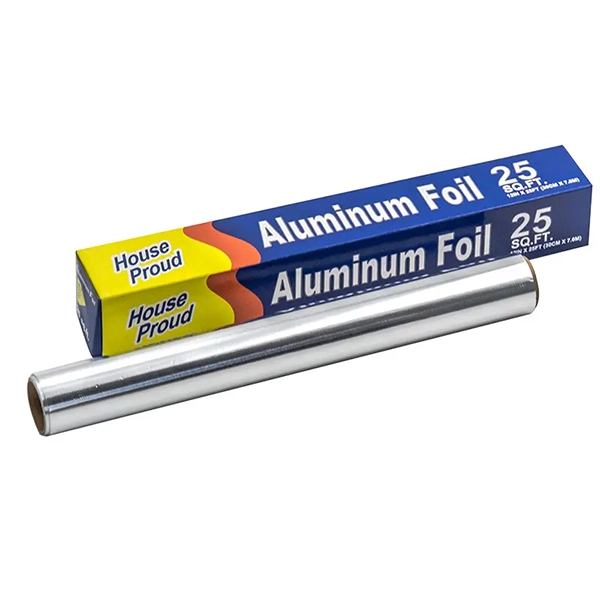

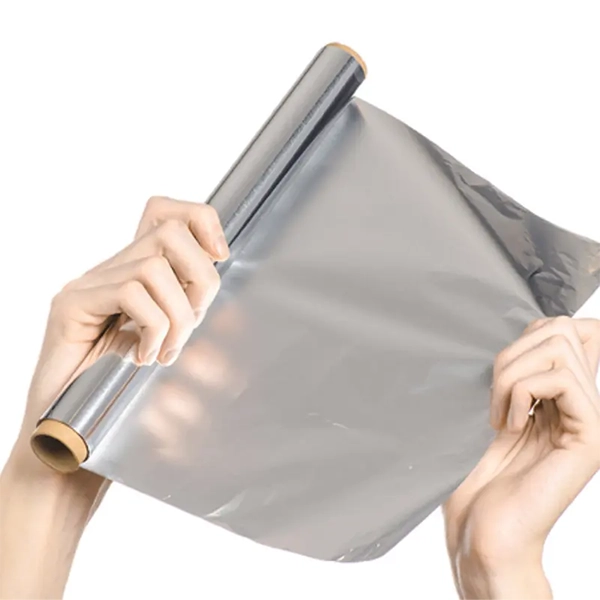

- Cooking
- When grilling meat, fish or vegetables, covering with aluminum foil can prevent moisture loss and prevent the skin from charring prematurely while the inside is not yet cooked. Aluminum foil can also be used to make "foil-wrapped dishes", wrapping and sealing the ingredients with seasonings to lock in the original flavor of the ingredients and create a steaming and grilling effect, which is especially suitable for grilling fish, shellfish and other seafood. Aluminum foil can be placed on the grill during grilling to prevent the ingredients from directly contacting the high-temperature grid and reduce the possibility of burning. Wrap vegetables and fruits to retain the original juice while preventing them from being burned by charcoal fire.
- Keep Fresh
- Aluminum foil has a strong airtightness and can be used to wrap leftovers to prevent odors from spreading or absorbing refrigerator odors. In particular, wrapping fish, meat and other ingredients in aluminum foil can not only lock in moisture, but also reduce contact with air, delaying the deterioration of ingredients. In addition, aluminum foil has excellent thermal insulation properties and can be used to keep food warm for a short period of time. For example: when you are at a picnic or takeout, wrap hot meals in aluminum foil to prevent the temperature from losing quickly.
- Freezing
- When freezing meat, bread or cooked food, wrapping them in aluminum foil before putting them in freezer bags can reduce freeze drying and prevent ice crystals from damaging the food structure. Aluminum foil can effectively isolate air and moisture and can be used to freeze vegetables or cooked meat for a long time. For example: wrap blanched vegetables in aluminum foil and freeze them to keep them fresh and colorful when you take them out.
- Baking
- When making baked goods, you can use aluminum foil to cover the surface of the food to prevent the surface from burning due to high temperature baking. When there is no suitable baking mold, aluminum foil can be used to make a simple mold or liner. When baking rolls, use aluminum foil to help fix the shape.
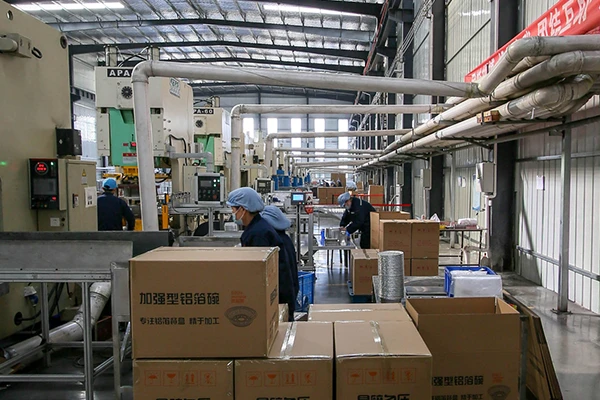
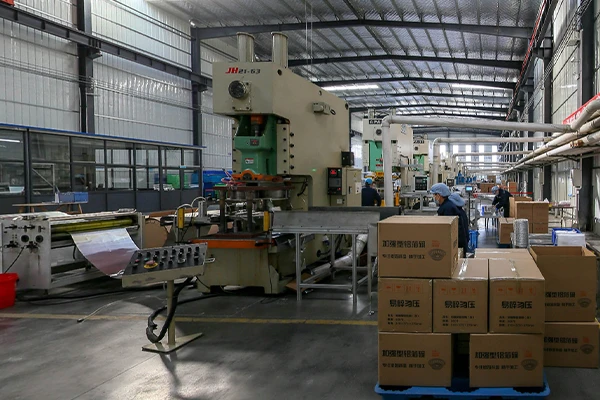
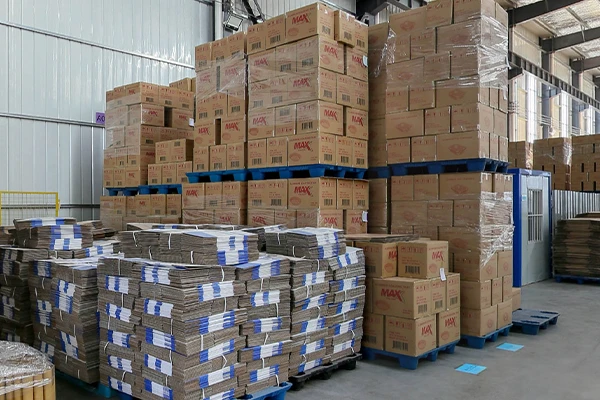
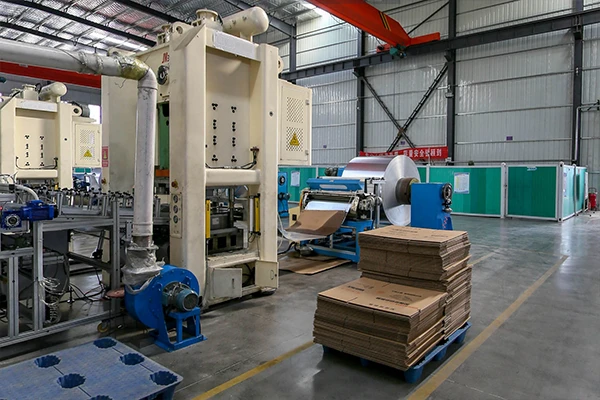
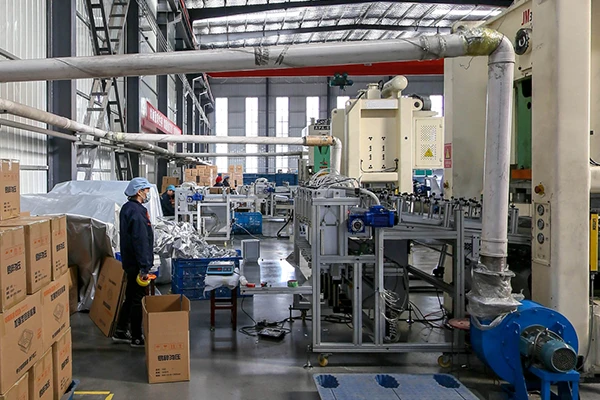
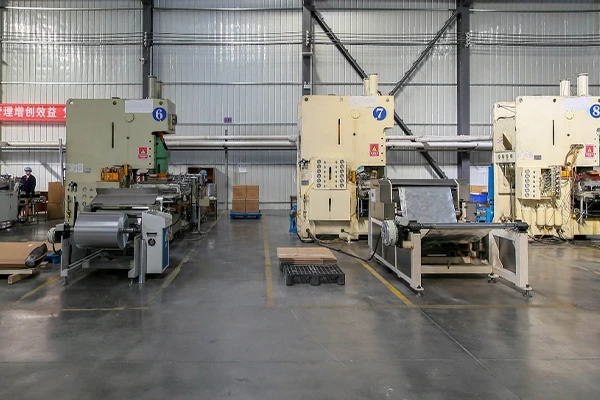
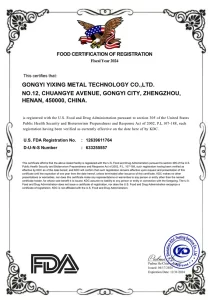
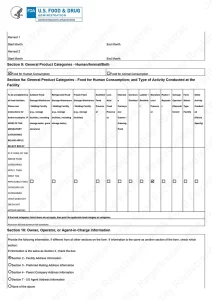
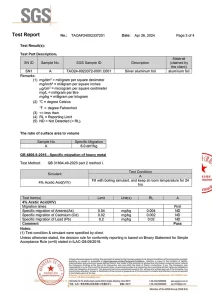
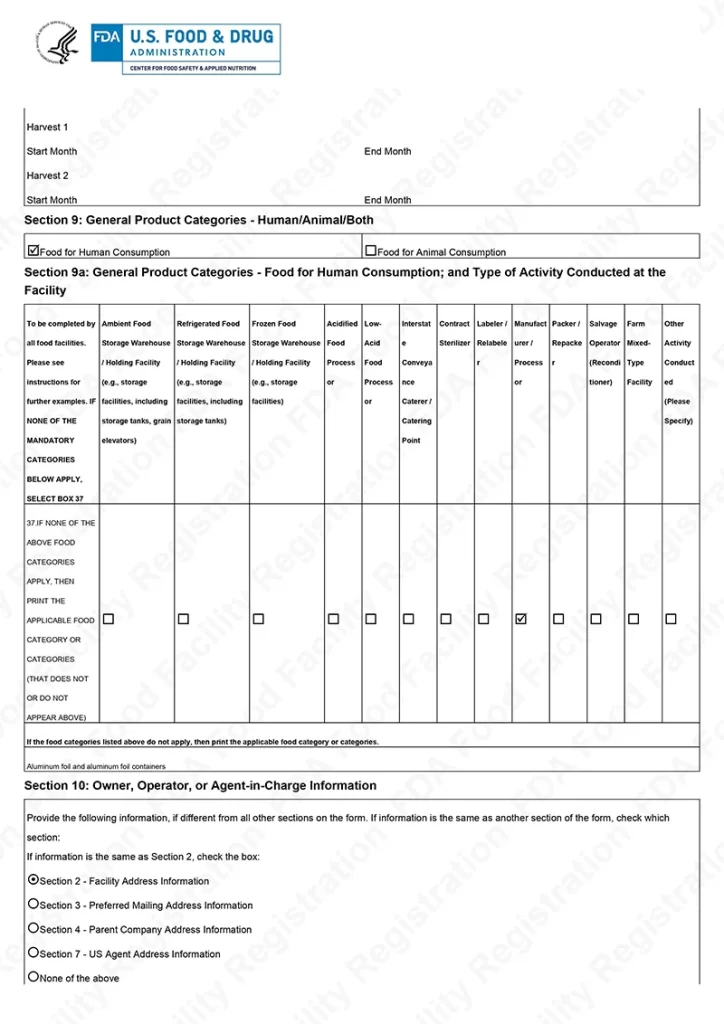
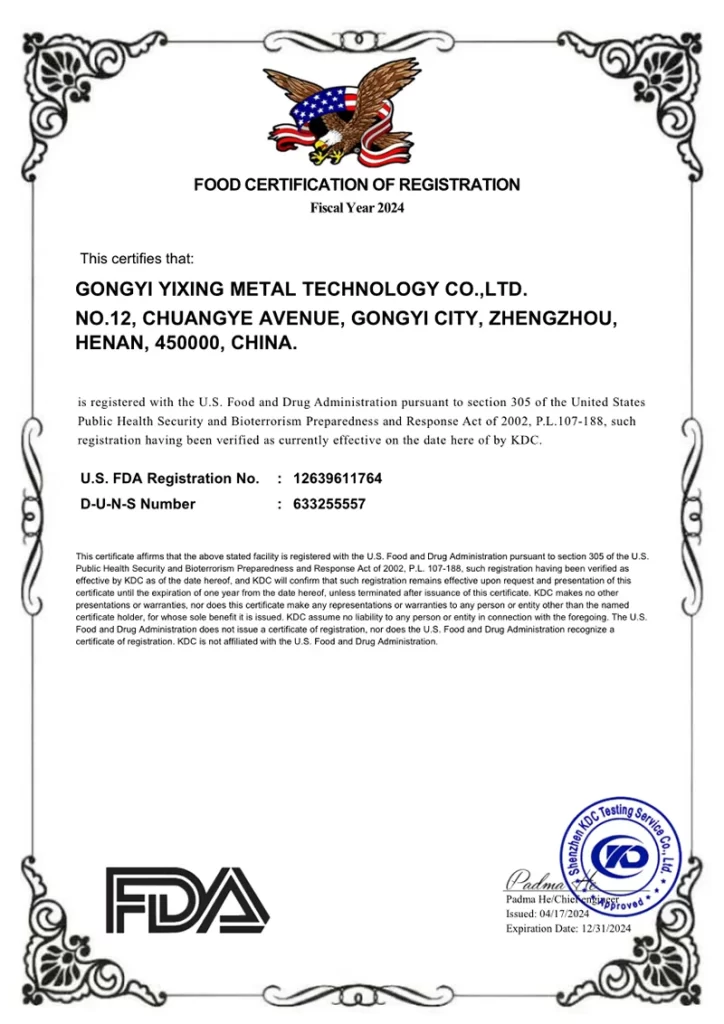
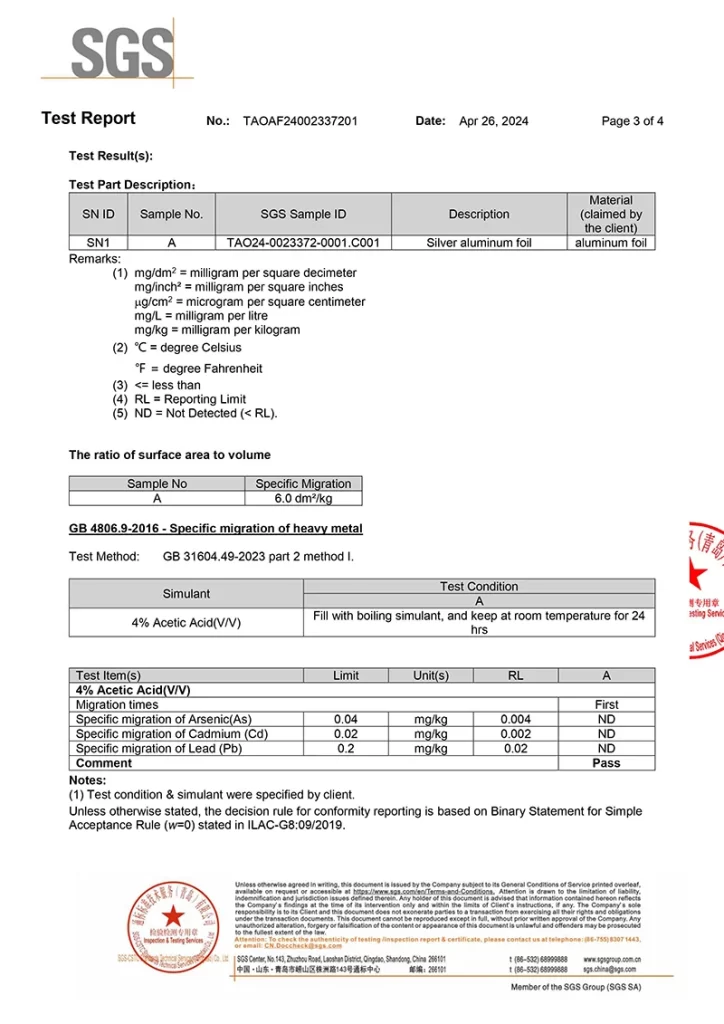
The biggest reason people choose to save aluminum foil is because it can be washed and reused multiple times. Aluminum foil is used to cover or wrap clean food, and it can be washed and reused.
Secondly, many people are constantly awakening to environmental awareness, and aluminum foil happens to be a recyclable material. So people save aluminum foil.
As of November 2024, there is no widespread shortage of aluminum foil. While some industries face specific challenges, such as Porsche experiencing aluminum alloy supply disruptions due to flooding at a supplier’s factory. These issues have not had a significant impact on consumers’ general access to aluminum foil.
In fact, the aluminum industry has shown signs of recovery and growth. The Aluminum Association reported that North American aluminum demand increased by 5.2% in the first half of 2024, indicating a rebound in demand from the weakness in 2023.
While there have been fluctuations in aluminum prices and localized supply chain disruptions, these have not led to a significant shortage of aluminum foil in 2024. Consumers can still continue to purchase aluminum foil rolls.
Aluminum foil can cause some health issues if used improperly. For example: When aluminum foil is exposed to high temperatures, small amounts of aluminum can leach into food. While the human body can eliminate small amounts of aluminum, long-term overexposure has been linked to Alzheimer’s disease.
Standard foil is thinner and more flexible, and is easier to tear or puncture. It is suitable for wrapping leftovers, covering dishes, or lining baking sheets. Heavy-duty foil is much thicker and stronger than standard foil, and is more resistant to tearing, punctures, and warping under high heat or pressure, making it ideal for grilling, baking, or wrapping large, dense items such as meats or casseroles.
Standard foil performs well at moderate temperatures, but may not hold up under prolonged high heat or direct flames. Heavy-duty foil is suitable for high heat and direct heat, suitable for tasks such as grilling or broiling, and can be used to tightly wrap food without losing its shape or tearing even during high-temperature cooking.
Standard foil is more affordable and available in most stores, and comes in smaller rolls with a lighter total weight; heavy-duty foil is usually sold in large rolls for bulk or heavy use.
The shiny side of the foil reflects heat more effectively, but both sides retain heat similarly.
When you use the shiny side to wrap food to keep it warm, it reflects the food’s heat back toward itself, keeping it warmer longer. The dark side facing outward can absorb some external heat, which may be helpful if the food is being heated from an external source (such as when wrapped near a heat source).
While the shiny side of foil reflects heat slightly better, it is the preferred choice for wrapping hot food to keep it warm. However, for most everyday uses, the difference is minimal, and either side of the foil will retain heat effectively.
Cooking with foil is convenient, but food sticking to it can be annoying. Here’s how to prevent food from sticking to foil:
Use non-stick foil
Non-stick foil is specifically made to prevent sticking. With a non-stick coating on one side, just place food on the non-stick side for best results. Perfect for sticky foods like fish, cheese-covered dishes, or sugary baked goods.
Spray with cooking spray or cooking oil
Before placing food, spray a thin layer of non-stick cooking spray directly on the foil, ensuring complete coverage.
Add a barrier
Place a sheet of parchment paper between the food and the foil. This prevents sticking while keeping the foil in place for even heat distribution.
Cooking with foil
Use foil to line baking sheets, laying the foil flat and pressing it into corners to create a smooth surface for cooking.
Covering food
Cover dishes or casseroles with foil, with the shiny side facing the food, to better retain heat.
Wrapping food
Wrap food tightly during baking or grilling. Use heavy-duty foil for large cuts of meat or foods with sharp edges.
Storing food
Wrap leftovers in foil and avoid direct contact with acidic or salty foods (such as ketchup or pickled foods), which can cause foil to degrade and transfer aluminum to the food.
Using foil on the grill
Make airtight packets to steam vegetables, fish, or meat; place foil under the grill to use as a drip tray; use foil to cover sections of the grill.
Insulating and holding heat
Wrap baked potatoes or bread in foil. When using foil in low-temperature environments, such as wrapping sandwiches or pizza, the shiny side faces outward to reflect external heat.
Avoid overuse
Limit food exposure to foil for extended periods of time, especially when cooking acidic or salty ingredients. Aluminum can leach into food over time, although usually in small amounts.
Dry salt usually does not react significantly with aluminum foil. As long as there is no moisture, salt will not react with aluminum foil.
As salt absorbs moisture from the air, it forms a salt solution, which may begin to react electrochemically with the aluminum foil. This will form holes or spots on the surface of the foil.
As long as the aluminum foil and salt are stored in a dry environment, the reaction can be completely avoided.
- Tin Foil – Although technically inaccurate (as aluminum replaced tin in foil production decades ago), many people still use this term colloquially to refer to aluminum foil.
- Aluminum Wrap – A casual way to refer to the foil, emphasizing its use for wrapping.
- Foil – A shorthand or simple term often used interchangeably with aluminum foil.
- Silver Paper – A colloquial term, referring to the shiny, silvery appearance of the foil.
If you’re looking for an alternative to aluminum foil, here are some that you can use for cooking, wrapping, or storage:
1. Parchment Paper
- Best for: Baking, Grilling, and Cooking
- Why: Parchment paper is heat-resistant and non-stick, making it great for lining baking sheets, covering food, and even steaming. It doesn’t react with food (especially acidic foods) and is compostable.
- Uses: Great for baking cookies, roasting vegetables, or lining cake pans.
2. Waxed Paper
- Best for: Packaging and Storage
- Why: Waxed paper is coated with a thin layer of wax that resists moisture but not heat. It’s great for wrapping food, lining trays, and keeping food fresh.
- Uses: Use it to wrap sandwiches, line drawers, or cover food in the fridge (but avoid using it in the oven, as it could catch fire).
3. Silicone Baking Mats
- Best for: Baking and Grilling
- Why: Silicone mats are reusable, non-stick, and great for use in the oven. They can withstand high temperatures and are a durable alternative to aluminum foil for baking.
- Uses: Great for baking cookies, roasting meats, or lining baking sheets.
As one of the aluminum takeaway container manufacturers and suppliers with 23 years of production experience in China, we provide high-standard aluminum foil containers, designed for global customers. Choose our export aluminum foil containers to experience the quality service and products of international standards.
Aluminum Foil Pie Pans, 9×13″ Foil Container, Square Foil Pan 8×8 YSA-SQ230, Round Microwavable Baking Pan

